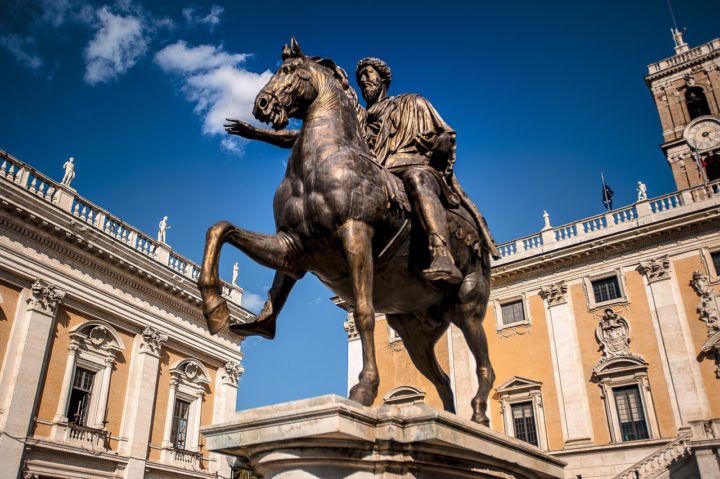A life focused on the cultivation of virtue was once a common endeavor of philosophers, theologians, soldiers, and even politicians (how times have changed). Unfortunately, virtue is such a lost concept today that even the word itself sounds archaic and irrelevant. Yet I have become convinced that seeking to live the virtuous life is essential for anyone who wants to increase happiness and human flourishing in their own life and in the world around them. Hopefully, sharing my story can help you begin your own virtue project.
Like most long journeys, the virtue project was born out of painful adversity and a desire for something better.
I guess you could say the adversity part was a bit of a perfect storm. I was going through a high degree of stress and uncertainty in my first year as a pastor; navigating unhealthy working relationships and a church split that I found out was in the making before I even got there. After just 8 months in my new career I found myself filling in for the senior pastor, struggling to keep a church together, and facing the possibility of uprooting my family with nowhere to go and no job opportunities lined up.
During this same time, my dad had severe health problems and we nearly lost him. I took several trips to help my family care for him and spend time with him. Eventually he received a transplant at the eleventh hour and began the long recovery process. Like I said, stressful.
Downward Spiral
My inability to process all this additional stress caused my physical health to take a nosedive. I started having headaches nearly every day and frequent debilitating migraines. Then I started taking a medication that helped my headaches but caused me to lose my appetite and develop moderate depression and anxiety. I developed repetitive nervous habits, had frequent feelings of impending doom and hopelessness, and a lack of motivation for work and hobbies. This culminated in frequent suicidal thoughts and feeling like everything was spiraling out of control.
Before you get the wrong idea, in general I maintained the impression that I was fine and that nothing was really wrong. Surely everything was just circumstantial and would go away once my situation improved. All of my internal struggles to be inconsequential since they were just going on inside my head. I just needed to snap out of it and everything would be normal again. Priding myself on my rationality, emotional control, and objectivity, I realized I could explain my problems so I might as well explain them away.
It wasn’t until I gathered up the courage to tell my wife about the thoughts and emotions I was experiencing that I realized how serious things had gotten. I wept at the realization of how much I was hurting and the idea that things didn’t have to be that way. And once I had told her, I now had the motivation and accountability to start making some changes.
Gathering Data
Approaching the problem like a scientist, I began gathering as much data as I could. I started to journal regularly about the internal pathologies and problems I was experiencing in my thoughts and emotions. I began to meditate, taking deep breaths and taking note of where my thoughts were wandering. This time period chiefly involved a careful fostering of self-awareness followed by reflection on what I was finding out about my internal life.
I began to research the issue of mental health and illness. I researched depression and anxiety, and became very interested in the role of thoughts and emotions in a person’s life. The mind, conscious and unconscious thought, and our ability to influence seemingly inaccessible thoughts and emotions over time captured much of my interest. I posited that we are always moving ourselves in one direction or another, and that those small nudges are what make our thought and emotional life change over time. The question was what that force of nudging consists of and how to improve the influence I am having over my mental and emotional life.
Discovering Virtue
It was around this time that I discovered the concept of virtue. Humans have reason, as well as thoughts, emotions, and desires. But my reason (or beliefs, faith) did not seem to have a strong reign and influence over my thoughts, emotions, passions, and desires. The weak connection was insufficient for me to make the internal changes that I desired. The ancient definition of virtue is the force of habit and character that brings our thoughts and emotions in line with our reason and beliefs. In essence, virtue is what makes us a whole and consistent person.
The ancient definition of virtue is the force of habit and character that brings our thoughts and emotions in line with our reason and beliefs.
I then began to consult resources on the topic, starting with the Men Without Chests chapter in the Abolition of Man. Notes in that book led me to Centuries of Meditations, Imitation of Christ, and other works that, amazingly, speak directly to this issue of the necessity of virtue. Only the older works tend to discuss this in detail or with any depth. My research has now begun to branch out into ancient philosophers all the way to modern-day positive psychology.
Launching the Virtue Project
This led me to the idea of the Virtue Project, an endeavor to begin building virtue in my own life while cataloguing everything I am learning and doing so that I can one day benefit others who find themselves in the same position I was in. I hope you find it helpful and encouraging, whether you are in the midst of adversity like I was, or you want to prepare yourself for the time you inevitably will face it.

Leave a Reply